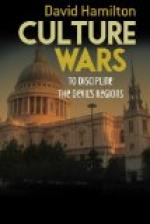—Thus they answered,—hoping,
fearing,
Some in faith,
and doubting some,
Till a trumpet-voice proclaiming,
Said, “My
chosen people, come!”
Then
the drum,
Lo!
was dumb,
For the great heart of the nation throbbing,
Answered, “Lord
we come."[2]
[Footnote 2: The Reveille, Bret Harte.]
Let us apply this thought to the command in our text, “Do this in remembrance of Me.” The facts are undisputed. Our Lord Jesus Christ, in the tenderness of His compassion, instituted an ordinance by which we might remember Him and feed upon Him.
Further than this we cannot go on the ground of universal consent. Strangely enough, that rite which is the same in its central act, whether celebrated by the nonconformist in his ordinary dress, or the priest clad in costly vestments, whether in the humble room or the stately cathedral, which is, on the one hand, the well-nigh universal mark of all who profess and call themselves Christians, is yet the battle-ground of fierce dispute and bitter disagreement.
The present crisis is undoubtedly deepening in our minds the exceeding value of this blessed gift of Christ to His Church.
It is deeply suggestive of the spirit of our young officers that a group of old public-school boys, just about to leave for the front, should have begged their late schoolmaster—now a Bishop—to give them a Celebration of Holy Communion in his own private Chapel on their last Sunday in England. What a beautiful send-off!
Then, turning to the scene of operations itself, we find a touching witness in the simple record sent by Admiral Sir John Jellicoe to his brother at Southampton. “We spent our Christmas Day waiting for the Germans, who did not appear. But we managed to find time for church and for three celebrations of Holy Communion, although the whole time we were cleared for action and the men were at their guns.”
Who can contemplate unmoved that spectacle of the men, not gathered in the peaceful security of the House of God, but out upon the ocean, expecting attack, realising the possible nearness of the end, leaving their guns but for the moment, then back again, strengthened for life or death by the sacred Body and Blood.
Or take the witness of Rev. E.R. Day, one of our Senior Army Chaplains serving with the Expeditionary Force. While home on a few days’ leave he preached at Lichfield Cathedral, and, touching upon the efficacy of prayer, testified how enormously it was valued by our soldiers now serving at the front. The Holy Communion was especially appreciated. On Christmas Day there were no fewer than seven hundred communicants from one regiment and four hundred from another, and the service was held in a ploughed field with a packing-case for an altar. He had conducted these services sometimes in the back-parlour of a public-house, in a stable, in a loft, in a lean-to shed, and in the open; anywhere, in fact, where room could be found. Out on the battlefield there was hardly any need for a compulsory parade service; the men had only to hear that a service was to be held and they would crowd to it.




